Entrepreneurship and Small Business Management Report - Module ABC
VerifiedAdded on 2021/02/19
|10
|2806
|35
Report
AI Summary
This report provides an in-depth analysis of entrepreneurship and small business management. It begins by defining entrepreneurship and introduces different types of entrepreneurial ventures, including small business, scalable, large company, and social entrepreneurship, along with their respective typologies. The report then explores the similarities and differences between these ventures. The second task delves into the impact of micro and small businesses on the economy, presenting relevant data and statistics, particularly within the UK, and emphasizing their contribution to GDP and employment. It also highlights the importance of small businesses in fostering the growth of the social economy, discussing aspects like competition, local hiring, and diversity. The third task focuses on the characteristics, traits, and skills of successful entrepreneurs, contrasting them with those of traditional business managers, and reflecting on the personality traits and mindset that drive entrepreneurial motivation, using the Big Five personality model. The report concludes by illustrating how background and experience can either hinder or foster entrepreneurship.

Entrepreneurship and Small
Business Management
Business Management
Paraphrase This Document
Need a fresh take? Get an instant paraphrase of this document with our AI Paraphraser
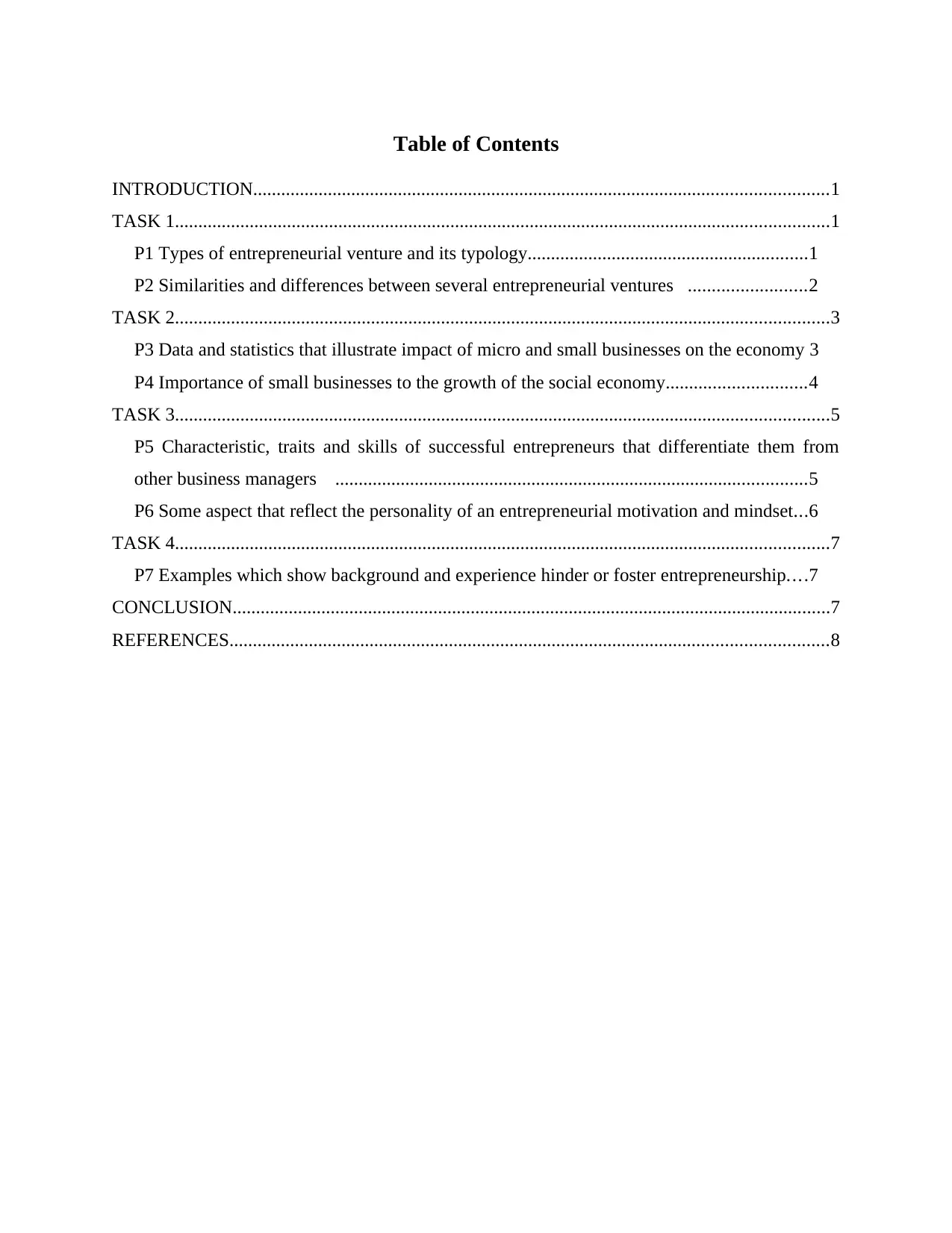
Table of Contents
INTRODUCTION...........................................................................................................................1
TASK 1............................................................................................................................................1
P1 Types of entrepreneurial venture and its typology............................................................1
P2 Similarities and differences between several entrepreneurial ventures .........................2
TASK 2............................................................................................................................................3
P3 Data and statistics that illustrate impact of micro and small businesses on the economy 3
P4 Importance of small businesses to the growth of the social economy..............................4
TASK 3............................................................................................................................................5
P5 Characteristic, traits and skills of successful entrepreneurs that differentiate them from
other business managers .....................................................................................................5
P6 Some aspect that reflect the personality of an entrepreneurial motivation and mindset...6
TASK 4............................................................................................................................................7
P7 Examples which show background and experience hinder or foster entrepreneurship....7
CONCLUSION................................................................................................................................7
REFERENCES................................................................................................................................8
INTRODUCTION...........................................................................................................................1
TASK 1............................................................................................................................................1
P1 Types of entrepreneurial venture and its typology............................................................1
P2 Similarities and differences between several entrepreneurial ventures .........................2
TASK 2............................................................................................................................................3
P3 Data and statistics that illustrate impact of micro and small businesses on the economy 3
P4 Importance of small businesses to the growth of the social economy..............................4
TASK 3............................................................................................................................................5
P5 Characteristic, traits and skills of successful entrepreneurs that differentiate them from
other business managers .....................................................................................................5
P6 Some aspect that reflect the personality of an entrepreneurial motivation and mindset...6
TASK 4............................................................................................................................................7
P7 Examples which show background and experience hinder or foster entrepreneurship....7
CONCLUSION................................................................................................................................7
REFERENCES................................................................................................................................8
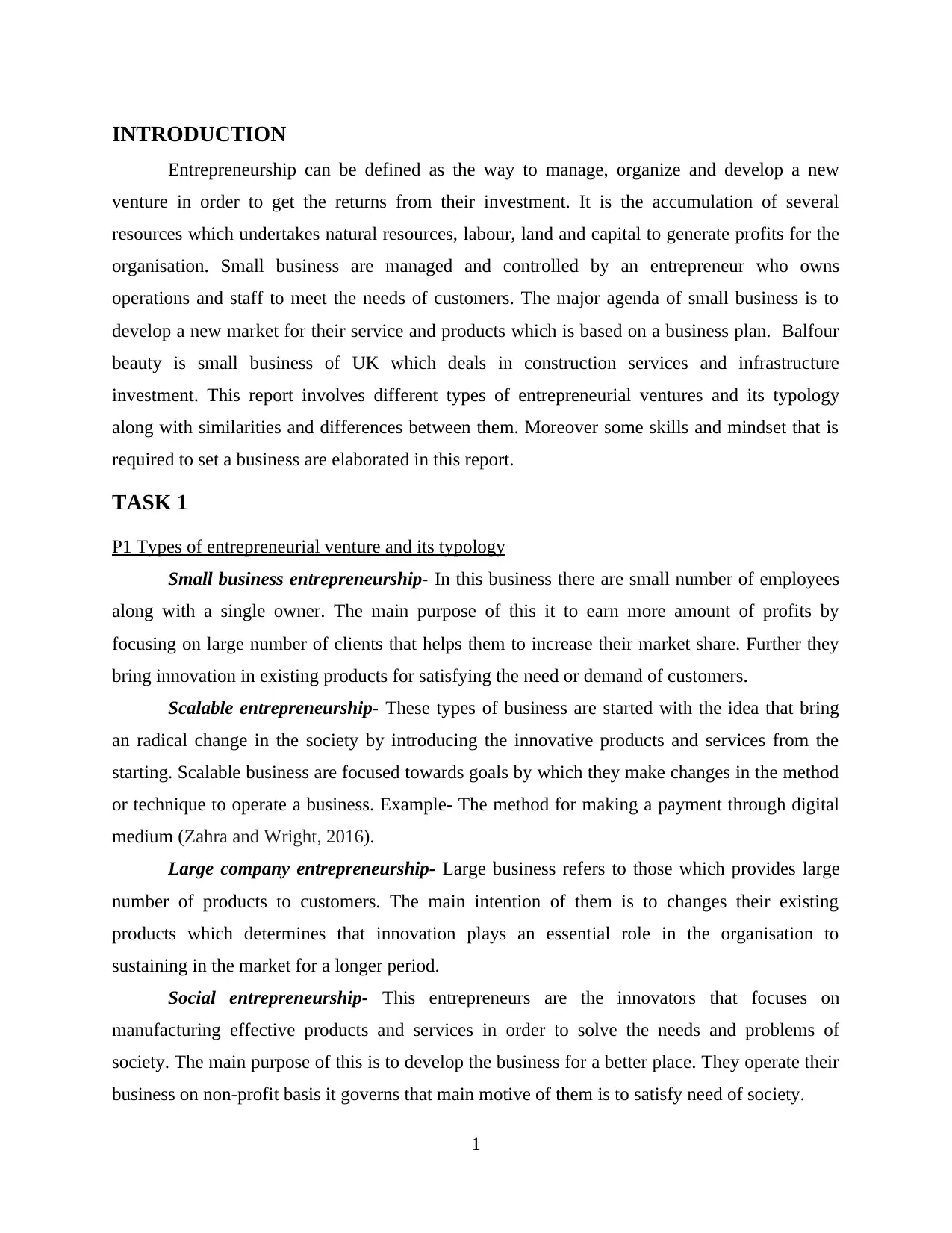
INTRODUCTION
Entrepreneurship can be defined as the way to manage, organize and develop a new
venture in order to get the returns from their investment. It is the accumulation of several
resources which undertakes natural resources, labour, land and capital to generate profits for the
organisation. Small business are managed and controlled by an entrepreneur who owns
operations and staff to meet the needs of customers. The major agenda of small business is to
develop a new market for their service and products which is based on a business plan. Balfour
beauty is small business of UK which deals in construction services and infrastructure
investment. This report involves different types of entrepreneurial ventures and its typology
along with similarities and differences between them. Moreover some skills and mindset that is
required to set a business are elaborated in this report.
TASK 1
P1 Types of entrepreneurial venture and its typology
Small business entrepreneurship- In this business there are small number of employees
along with a single owner. The main purpose of this it to earn more amount of profits by
focusing on large number of clients that helps them to increase their market share. Further they
bring innovation in existing products for satisfying the need or demand of customers.
Scalable entrepreneurship- These types of business are started with the idea that bring
an radical change in the society by introducing the innovative products and services from the
starting. Scalable business are focused towards goals by which they make changes in the method
or technique to operate a business. Example- The method for making a payment through digital
medium (Zahra and Wright, 2016).
Large company entrepreneurship- Large business refers to those which provides large
number of products to customers. The main intention of them is to changes their existing
products which determines that innovation plays an essential role in the organisation to
sustaining in the market for a longer period.
Social entrepreneurship- This entrepreneurs are the innovators that focuses on
manufacturing effective products and services in order to solve the needs and problems of
society. The main purpose of this is to develop the business for a better place. They operate their
business on non-profit basis it governs that main motive of them is to satisfy need of society.
1
Entrepreneurship can be defined as the way to manage, organize and develop a new
venture in order to get the returns from their investment. It is the accumulation of several
resources which undertakes natural resources, labour, land and capital to generate profits for the
organisation. Small business are managed and controlled by an entrepreneur who owns
operations and staff to meet the needs of customers. The major agenda of small business is to
develop a new market for their service and products which is based on a business plan. Balfour
beauty is small business of UK which deals in construction services and infrastructure
investment. This report involves different types of entrepreneurial ventures and its typology
along with similarities and differences between them. Moreover some skills and mindset that is
required to set a business are elaborated in this report.
TASK 1
P1 Types of entrepreneurial venture and its typology
Small business entrepreneurship- In this business there are small number of employees
along with a single owner. The main purpose of this it to earn more amount of profits by
focusing on large number of clients that helps them to increase their market share. Further they
bring innovation in existing products for satisfying the need or demand of customers.
Scalable entrepreneurship- These types of business are started with the idea that bring
an radical change in the society by introducing the innovative products and services from the
starting. Scalable business are focused towards goals by which they make changes in the method
or technique to operate a business. Example- The method for making a payment through digital
medium (Zahra and Wright, 2016).
Large company entrepreneurship- Large business refers to those which provides large
number of products to customers. The main intention of them is to changes their existing
products which determines that innovation plays an essential role in the organisation to
sustaining in the market for a longer period.
Social entrepreneurship- This entrepreneurs are the innovators that focuses on
manufacturing effective products and services in order to solve the needs and problems of
society. The main purpose of this is to develop the business for a better place. They operate their
business on non-profit basis it governs that main motive of them is to satisfy need of society.
1
⊘ This is a preview!⊘
Do you want full access?
Subscribe today to unlock all pages.

Trusted by 1+ million students worldwide
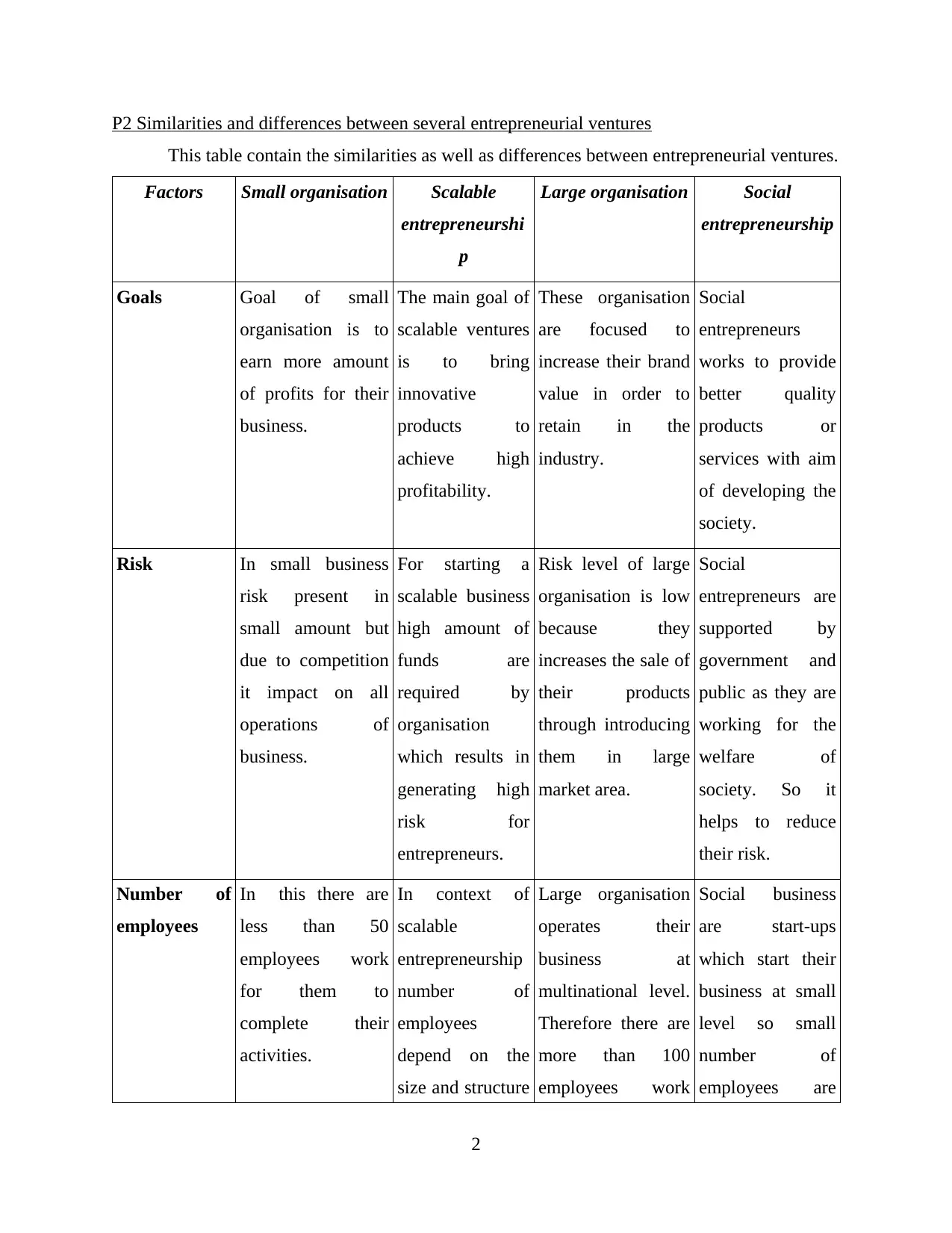
P2 Similarities and differences between several entrepreneurial ventures
This table contain the similarities as well as differences between entrepreneurial ventures.
Factors Small organisation Scalable
entrepreneurshi
p
Large organisation Social
entrepreneurship
Goals Goal of small
organisation is to
earn more amount
of profits for their
business.
The main goal of
scalable ventures
is to bring
innovative
products to
achieve high
profitability.
These organisation
are focused to
increase their brand
value in order to
retain in the
industry.
Social
entrepreneurs
works to provide
better quality
products or
services with aim
of developing the
society.
Risk In small business
risk present in
small amount but
due to competition
it impact on all
operations of
business.
For starting a
scalable business
high amount of
funds are
required by
organisation
which results in
generating high
risk for
entrepreneurs.
Risk level of large
organisation is low
because they
increases the sale of
their products
through introducing
them in large
market area.
Social
entrepreneurs are
supported by
government and
public as they are
working for the
welfare of
society. So it
helps to reduce
their risk.
Number of
employees
In this there are
less than 50
employees work
for them to
complete their
activities.
In context of
scalable
entrepreneurship
number of
employees
depend on the
size and structure
Large organisation
operates their
business at
multinational level.
Therefore there are
more than 100
employees work
Social business
are start-ups
which start their
business at small
level so small
number of
employees are
2
This table contain the similarities as well as differences between entrepreneurial ventures.
Factors Small organisation Scalable
entrepreneurshi
p
Large organisation Social
entrepreneurship
Goals Goal of small
organisation is to
earn more amount
of profits for their
business.
The main goal of
scalable ventures
is to bring
innovative
products to
achieve high
profitability.
These organisation
are focused to
increase their brand
value in order to
retain in the
industry.
Social
entrepreneurs
works to provide
better quality
products or
services with aim
of developing the
society.
Risk In small business
risk present in
small amount but
due to competition
it impact on all
operations of
business.
For starting a
scalable business
high amount of
funds are
required by
organisation
which results in
generating high
risk for
entrepreneurs.
Risk level of large
organisation is low
because they
increases the sale of
their products
through introducing
them in large
market area.
Social
entrepreneurs are
supported by
government and
public as they are
working for the
welfare of
society. So it
helps to reduce
their risk.
Number of
employees
In this there are
less than 50
employees work
for them to
complete their
activities.
In context of
scalable
entrepreneurship
number of
employees
depend on the
size and structure
Large organisation
operates their
business at
multinational level.
Therefore there are
more than 100
employees work
Social business
are start-ups
which start their
business at small
level so small
number of
employees are
2
Paraphrase This Document
Need a fresh take? Get an instant paraphrase of this document with our AI Paraphraser
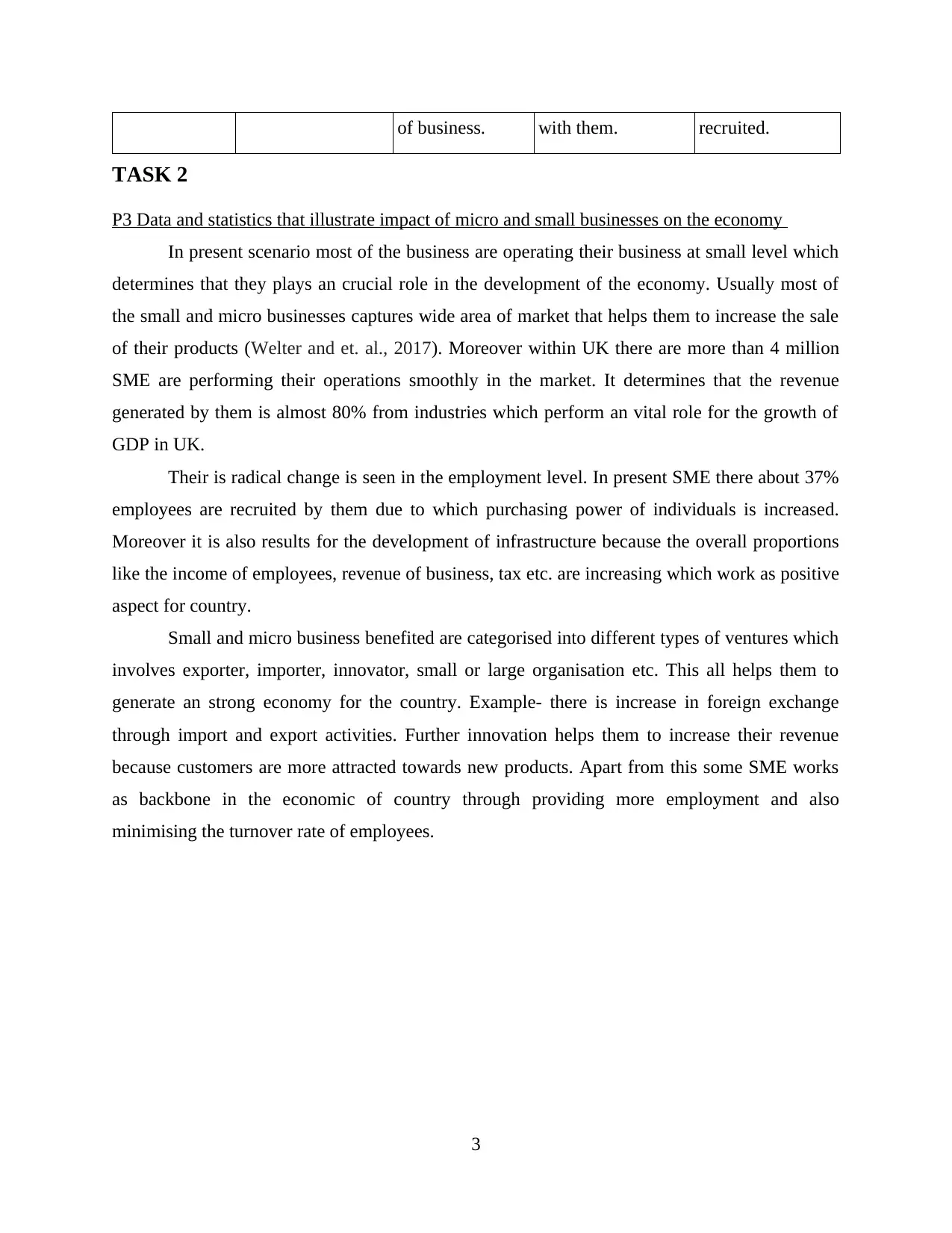
of business. with them. recruited.
TASK 2
P3 Data and statistics that illustrate impact of micro and small businesses on the economy
In present scenario most of the business are operating their business at small level which
determines that they plays an crucial role in the development of the economy. Usually most of
the small and micro businesses captures wide area of market that helps them to increase the sale
of their products (Welter and et. al., 2017). Moreover within UK there are more than 4 million
SME are performing their operations smoothly in the market. It determines that the revenue
generated by them is almost 80% from industries which perform an vital role for the growth of
GDP in UK.
Their is radical change is seen in the employment level. In present SME there about 37%
employees are recruited by them due to which purchasing power of individuals is increased.
Moreover it is also results for the development of infrastructure because the overall proportions
like the income of employees, revenue of business, tax etc. are increasing which work as positive
aspect for country.
Small and micro business benefited are categorised into different types of ventures which
involves exporter, importer, innovator, small or large organisation etc. This all helps them to
generate an strong economy for the country. Example- there is increase in foreign exchange
through import and export activities. Further innovation helps them to increase their revenue
because customers are more attracted towards new products. Apart from this some SME works
as backbone in the economic of country through providing more employment and also
minimising the turnover rate of employees.
3
TASK 2
P3 Data and statistics that illustrate impact of micro and small businesses on the economy
In present scenario most of the business are operating their business at small level which
determines that they plays an crucial role in the development of the economy. Usually most of
the small and micro businesses captures wide area of market that helps them to increase the sale
of their products (Welter and et. al., 2017). Moreover within UK there are more than 4 million
SME are performing their operations smoothly in the market. It determines that the revenue
generated by them is almost 80% from industries which perform an vital role for the growth of
GDP in UK.
Their is radical change is seen in the employment level. In present SME there about 37%
employees are recruited by them due to which purchasing power of individuals is increased.
Moreover it is also results for the development of infrastructure because the overall proportions
like the income of employees, revenue of business, tax etc. are increasing which work as positive
aspect for country.
Small and micro business benefited are categorised into different types of ventures which
involves exporter, importer, innovator, small or large organisation etc. This all helps them to
generate an strong economy for the country. Example- there is increase in foreign exchange
through import and export activities. Further innovation helps them to increase their revenue
because customers are more attracted towards new products. Apart from this some SME works
as backbone in the economic of country through providing more employment and also
minimising the turnover rate of employees.
3
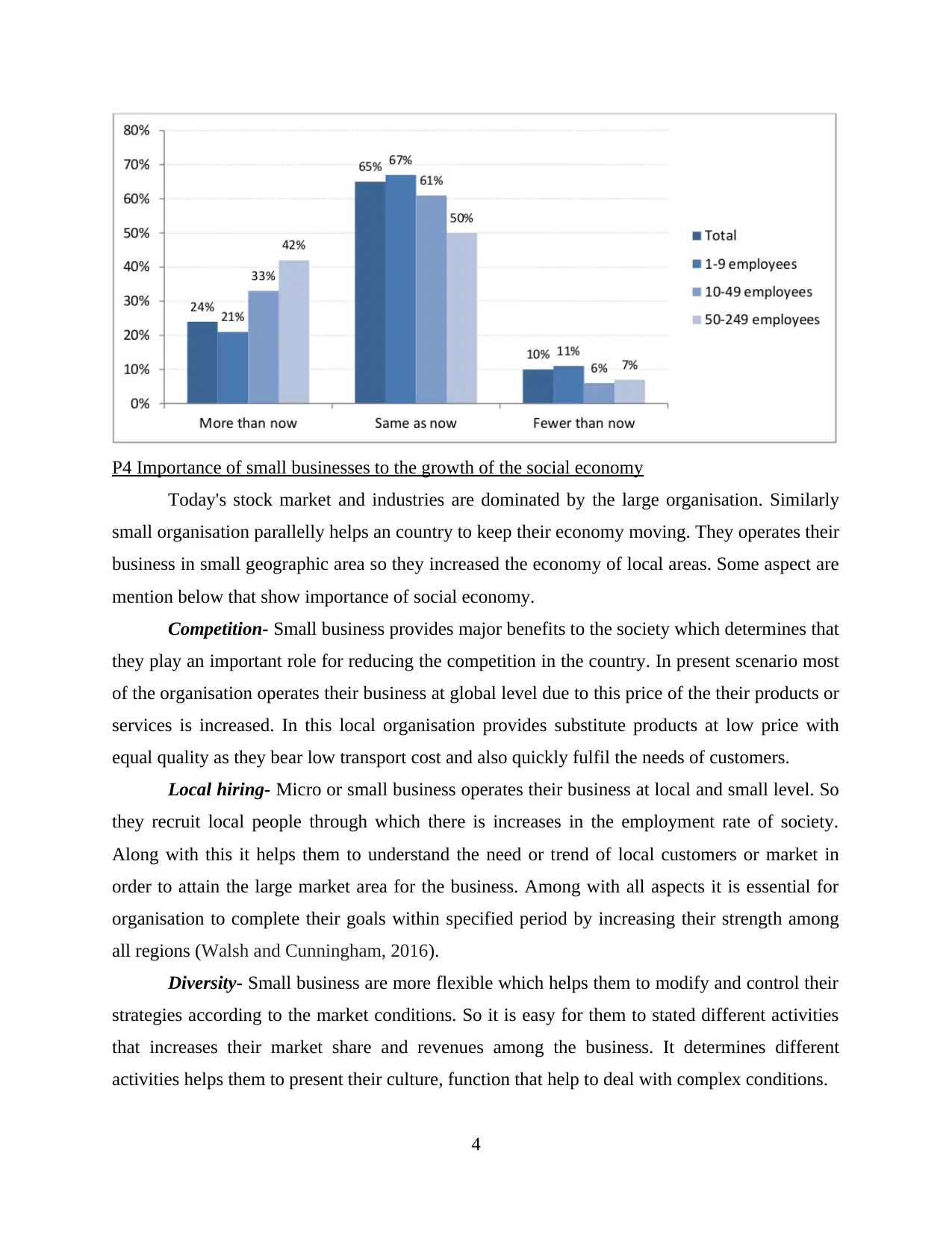
P4 Importance of small businesses to the growth of the social economy
Today's stock market and industries are dominated by the large organisation. Similarly
small organisation parallelly helps an country to keep their economy moving. They operates their
business in small geographic area so they increased the economy of local areas. Some aspect are
mention below that show importance of social economy.
Competition- Small business provides major benefits to the society which determines that
they play an important role for reducing the competition in the country. In present scenario most
of the organisation operates their business at global level due to this price of the their products or
services is increased. In this local organisation provides substitute products at low price with
equal quality as they bear low transport cost and also quickly fulfil the needs of customers.
Local hiring- Micro or small business operates their business at local and small level. So
they recruit local people through which there is increases in the employment rate of society.
Along with this it helps them to understand the need or trend of local customers or market in
order to attain the large market area for the business. Among with all aspects it is essential for
organisation to complete their goals within specified period by increasing their strength among
all regions (Walsh and Cunningham, 2016).
Diversity- Small business are more flexible which helps them to modify and control their
strategies according to the market conditions. So it is easy for them to stated different activities
that increases their market share and revenues among the business. It determines different
activities helps them to present their culture, function that help to deal with complex conditions.
4
Today's stock market and industries are dominated by the large organisation. Similarly
small organisation parallelly helps an country to keep their economy moving. They operates their
business in small geographic area so they increased the economy of local areas. Some aspect are
mention below that show importance of social economy.
Competition- Small business provides major benefits to the society which determines that
they play an important role for reducing the competition in the country. In present scenario most
of the organisation operates their business at global level due to this price of the their products or
services is increased. In this local organisation provides substitute products at low price with
equal quality as they bear low transport cost and also quickly fulfil the needs of customers.
Local hiring- Micro or small business operates their business at local and small level. So
they recruit local people through which there is increases in the employment rate of society.
Along with this it helps them to understand the need or trend of local customers or market in
order to attain the large market area for the business. Among with all aspects it is essential for
organisation to complete their goals within specified period by increasing their strength among
all regions (Walsh and Cunningham, 2016).
Diversity- Small business are more flexible which helps them to modify and control their
strategies according to the market conditions. So it is easy for them to stated different activities
that increases their market share and revenues among the business. It determines different
activities helps them to present their culture, function that help to deal with complex conditions.
4
⊘ This is a preview!⊘
Do you want full access?
Subscribe today to unlock all pages.

Trusted by 1+ million students worldwide
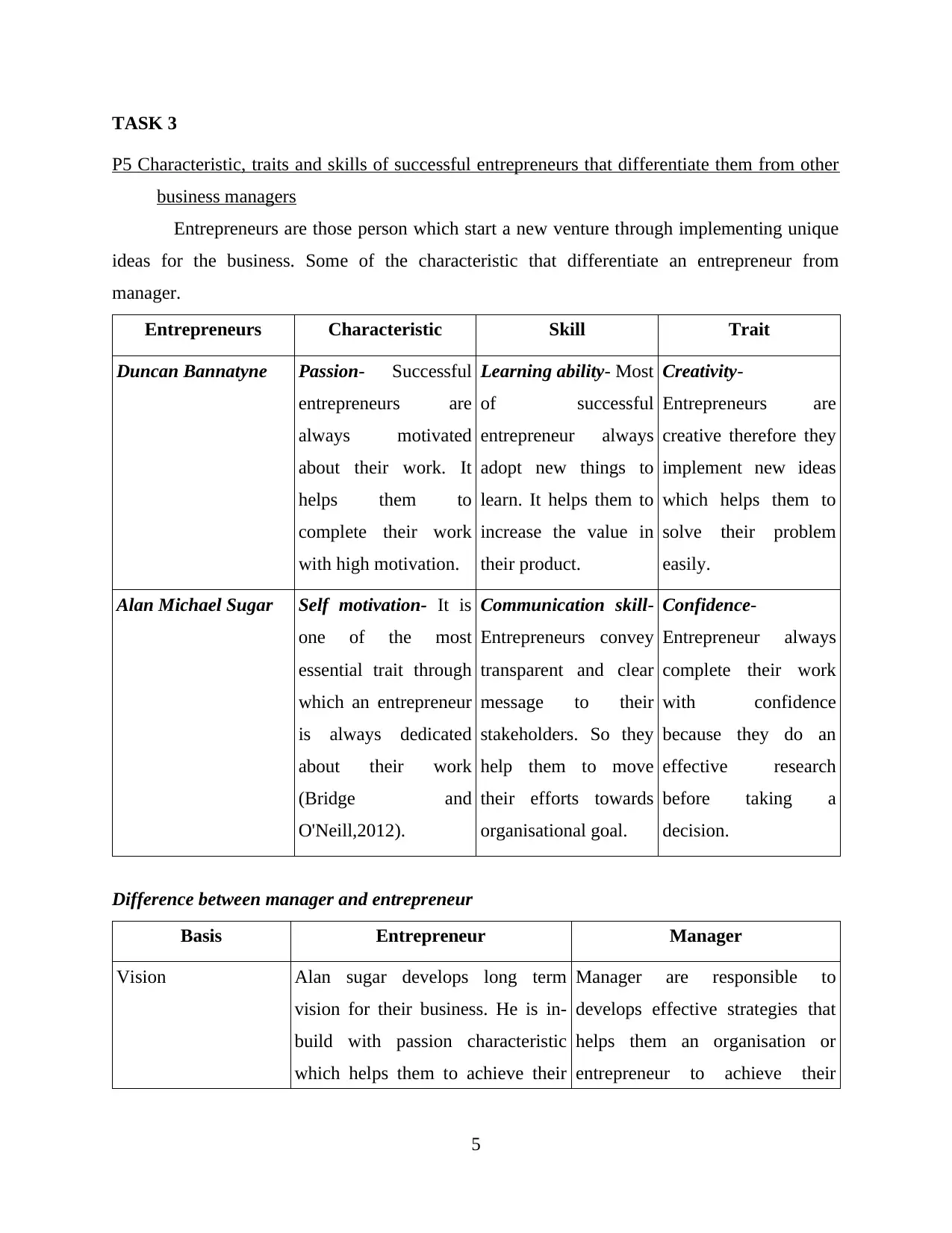
TASK 3
P5 Characteristic, traits and skills of successful entrepreneurs that differentiate them from other
business managers
Entrepreneurs are those person which start a new venture through implementing unique
ideas for the business. Some of the characteristic that differentiate an entrepreneur from
manager.
Entrepreneurs Characteristic Skill Trait
Duncan Bannatyne Passion- Successful
entrepreneurs are
always motivated
about their work. It
helps them to
complete their work
with high motivation.
Learning ability- Most
of successful
entrepreneur always
adopt new things to
learn. It helps them to
increase the value in
their product.
Creativity-
Entrepreneurs are
creative therefore they
implement new ideas
which helps them to
solve their problem
easily.
Alan Michael Sugar Self motivation- It is
one of the most
essential trait through
which an entrepreneur
is always dedicated
about their work
(Bridge and
O'Neill,2012).
Communication skill-
Entrepreneurs convey
transparent and clear
message to their
stakeholders. So they
help them to move
their efforts towards
organisational goal.
Confidence-
Entrepreneur always
complete their work
with confidence
because they do an
effective research
before taking a
decision.
Difference between manager and entrepreneur
Basis Entrepreneur Manager
Vision Alan sugar develops long term
vision for their business. He is in-
build with passion characteristic
which helps them to achieve their
Manager are responsible to
develops effective strategies that
helps them an organisation or
entrepreneur to achieve their
5
P5 Characteristic, traits and skills of successful entrepreneurs that differentiate them from other
business managers
Entrepreneurs are those person which start a new venture through implementing unique
ideas for the business. Some of the characteristic that differentiate an entrepreneur from
manager.
Entrepreneurs Characteristic Skill Trait
Duncan Bannatyne Passion- Successful
entrepreneurs are
always motivated
about their work. It
helps them to
complete their work
with high motivation.
Learning ability- Most
of successful
entrepreneur always
adopt new things to
learn. It helps them to
increase the value in
their product.
Creativity-
Entrepreneurs are
creative therefore they
implement new ideas
which helps them to
solve their problem
easily.
Alan Michael Sugar Self motivation- It is
one of the most
essential trait through
which an entrepreneur
is always dedicated
about their work
(Bridge and
O'Neill,2012).
Communication skill-
Entrepreneurs convey
transparent and clear
message to their
stakeholders. So they
help them to move
their efforts towards
organisational goal.
Confidence-
Entrepreneur always
complete their work
with confidence
because they do an
effective research
before taking a
decision.
Difference between manager and entrepreneur
Basis Entrepreneur Manager
Vision Alan sugar develops long term
vision for their business. He is in-
build with passion characteristic
which helps them to achieve their
Manager are responsible to
develops effective strategies that
helps them an organisation or
entrepreneur to achieve their
5
Paraphrase This Document
Need a fresh take? Get an instant paraphrase of this document with our AI Paraphraser
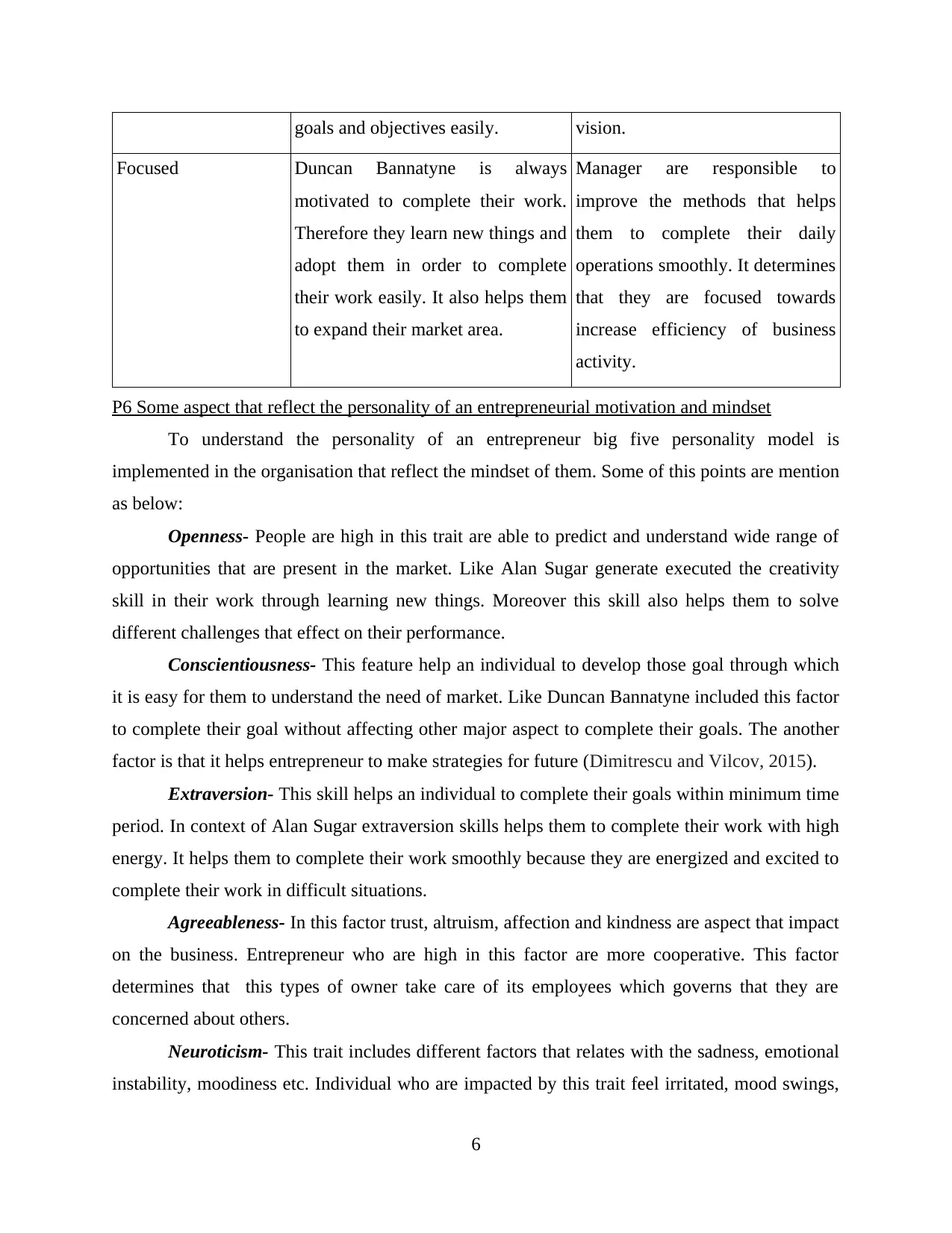
goals and objectives easily. vision.
Focused Duncan Bannatyne is always
motivated to complete their work.
Therefore they learn new things and
adopt them in order to complete
their work easily. It also helps them
to expand their market area.
Manager are responsible to
improve the methods that helps
them to complete their daily
operations smoothly. It determines
that they are focused towards
increase efficiency of business
activity.
P6 Some aspect that reflect the personality of an entrepreneurial motivation and mindset
To understand the personality of an entrepreneur big five personality model is
implemented in the organisation that reflect the mindset of them. Some of this points are mention
as below:
Openness- People are high in this trait are able to predict and understand wide range of
opportunities that are present in the market. Like Alan Sugar generate executed the creativity
skill in their work through learning new things. Moreover this skill also helps them to solve
different challenges that effect on their performance.
Conscientiousness- This feature help an individual to develop those goal through which
it is easy for them to understand the need of market. Like Duncan Bannatyne included this factor
to complete their goal without affecting other major aspect to complete their goals. The another
factor is that it helps entrepreneur to make strategies for future (Dimitrescu and Vilcov, 2015).
Extraversion- This skill helps an individual to complete their goals within minimum time
period. In context of Alan Sugar extraversion skills helps them to complete their work with high
energy. It helps them to complete their work smoothly because they are energized and excited to
complete their work in difficult situations.
Agreeableness- In this factor trust, altruism, affection and kindness are aspect that impact
on the business. Entrepreneur who are high in this factor are more cooperative. This factor
determines that this types of owner take care of its employees which governs that they are
concerned about others.
Neuroticism- This trait includes different factors that relates with the sadness, emotional
instability, moodiness etc. Individual who are impacted by this trait feel irritated, mood swings,
6
Focused Duncan Bannatyne is always
motivated to complete their work.
Therefore they learn new things and
adopt them in order to complete
their work easily. It also helps them
to expand their market area.
Manager are responsible to
improve the methods that helps
them to complete their daily
operations smoothly. It determines
that they are focused towards
increase efficiency of business
activity.
P6 Some aspect that reflect the personality of an entrepreneurial motivation and mindset
To understand the personality of an entrepreneur big five personality model is
implemented in the organisation that reflect the mindset of them. Some of this points are mention
as below:
Openness- People are high in this trait are able to predict and understand wide range of
opportunities that are present in the market. Like Alan Sugar generate executed the creativity
skill in their work through learning new things. Moreover this skill also helps them to solve
different challenges that effect on their performance.
Conscientiousness- This feature help an individual to develop those goal through which
it is easy for them to understand the need of market. Like Duncan Bannatyne included this factor
to complete their goal without affecting other major aspect to complete their goals. The another
factor is that it helps entrepreneur to make strategies for future (Dimitrescu and Vilcov, 2015).
Extraversion- This skill helps an individual to complete their goals within minimum time
period. In context of Alan Sugar extraversion skills helps them to complete their work with high
energy. It helps them to complete their work smoothly because they are energized and excited to
complete their work in difficult situations.
Agreeableness- In this factor trust, altruism, affection and kindness are aspect that impact
on the business. Entrepreneur who are high in this factor are more cooperative. This factor
determines that this types of owner take care of its employees which governs that they are
concerned about others.
Neuroticism- This trait includes different factors that relates with the sadness, emotional
instability, moodiness etc. Individual who are impacted by this trait feel irritated, mood swings,
6
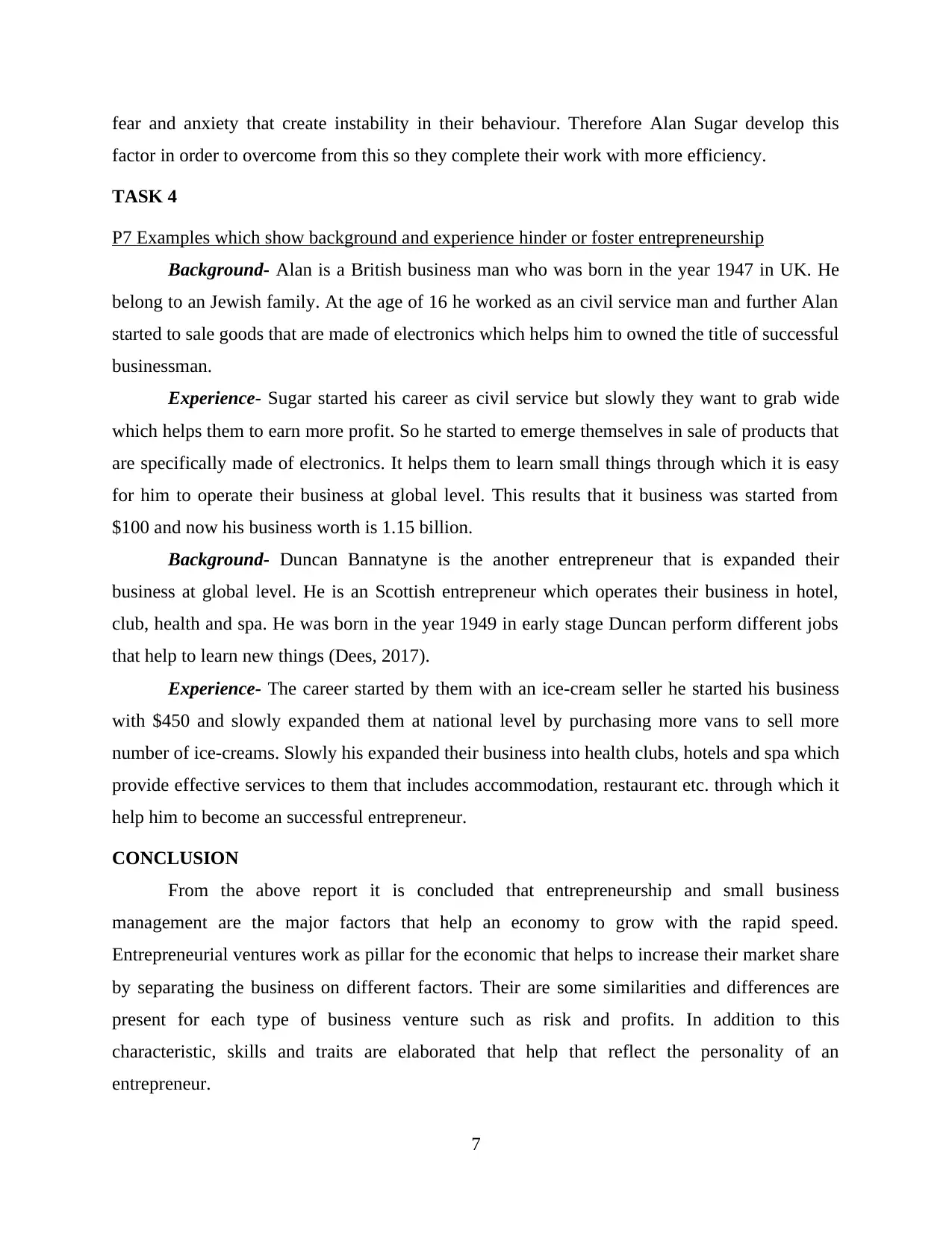
fear and anxiety that create instability in their behaviour. Therefore Alan Sugar develop this
factor in order to overcome from this so they complete their work with more efficiency.
TASK 4
P7 Examples which show background and experience hinder or foster entrepreneurship
Background- Alan is a British business man who was born in the year 1947 in UK. He
belong to an Jewish family. At the age of 16 he worked as an civil service man and further Alan
started to sale goods that are made of electronics which helps him to owned the title of successful
businessman.
Experience- Sugar started his career as civil service but slowly they want to grab wide
which helps them to earn more profit. So he started to emerge themselves in sale of products that
are specifically made of electronics. It helps them to learn small things through which it is easy
for him to operate their business at global level. This results that it business was started from
$100 and now his business worth is 1.15 billion.
Background- Duncan Bannatyne is the another entrepreneur that is expanded their
business at global level. He is an Scottish entrepreneur which operates their business in hotel,
club, health and spa. He was born in the year 1949 in early stage Duncan perform different jobs
that help to learn new things (Dees, 2017).
Experience- The career started by them with an ice-cream seller he started his business
with $450 and slowly expanded them at national level by purchasing more vans to sell more
number of ice-creams. Slowly his expanded their business into health clubs, hotels and spa which
provide effective services to them that includes accommodation, restaurant etc. through which it
help him to become an successful entrepreneur.
CONCLUSION
From the above report it is concluded that entrepreneurship and small business
management are the major factors that help an economy to grow with the rapid speed.
Entrepreneurial ventures work as pillar for the economic that helps to increase their market share
by separating the business on different factors. Their are some similarities and differences are
present for each type of business venture such as risk and profits. In addition to this
characteristic, skills and traits are elaborated that help that reflect the personality of an
entrepreneur.
7
factor in order to overcome from this so they complete their work with more efficiency.
TASK 4
P7 Examples which show background and experience hinder or foster entrepreneurship
Background- Alan is a British business man who was born in the year 1947 in UK. He
belong to an Jewish family. At the age of 16 he worked as an civil service man and further Alan
started to sale goods that are made of electronics which helps him to owned the title of successful
businessman.
Experience- Sugar started his career as civil service but slowly they want to grab wide
which helps them to earn more profit. So he started to emerge themselves in sale of products that
are specifically made of electronics. It helps them to learn small things through which it is easy
for him to operate their business at global level. This results that it business was started from
$100 and now his business worth is 1.15 billion.
Background- Duncan Bannatyne is the another entrepreneur that is expanded their
business at global level. He is an Scottish entrepreneur which operates their business in hotel,
club, health and spa. He was born in the year 1949 in early stage Duncan perform different jobs
that help to learn new things (Dees, 2017).
Experience- The career started by them with an ice-cream seller he started his business
with $450 and slowly expanded them at national level by purchasing more vans to sell more
number of ice-creams. Slowly his expanded their business into health clubs, hotels and spa which
provide effective services to them that includes accommodation, restaurant etc. through which it
help him to become an successful entrepreneur.
CONCLUSION
From the above report it is concluded that entrepreneurship and small business
management are the major factors that help an economy to grow with the rapid speed.
Entrepreneurial ventures work as pillar for the economic that helps to increase their market share
by separating the business on different factors. Their are some similarities and differences are
present for each type of business venture such as risk and profits. In addition to this
characteristic, skills and traits are elaborated that help that reflect the personality of an
entrepreneur.
7
⊘ This is a preview!⊘
Do you want full access?
Subscribe today to unlock all pages.

Trusted by 1+ million students worldwide
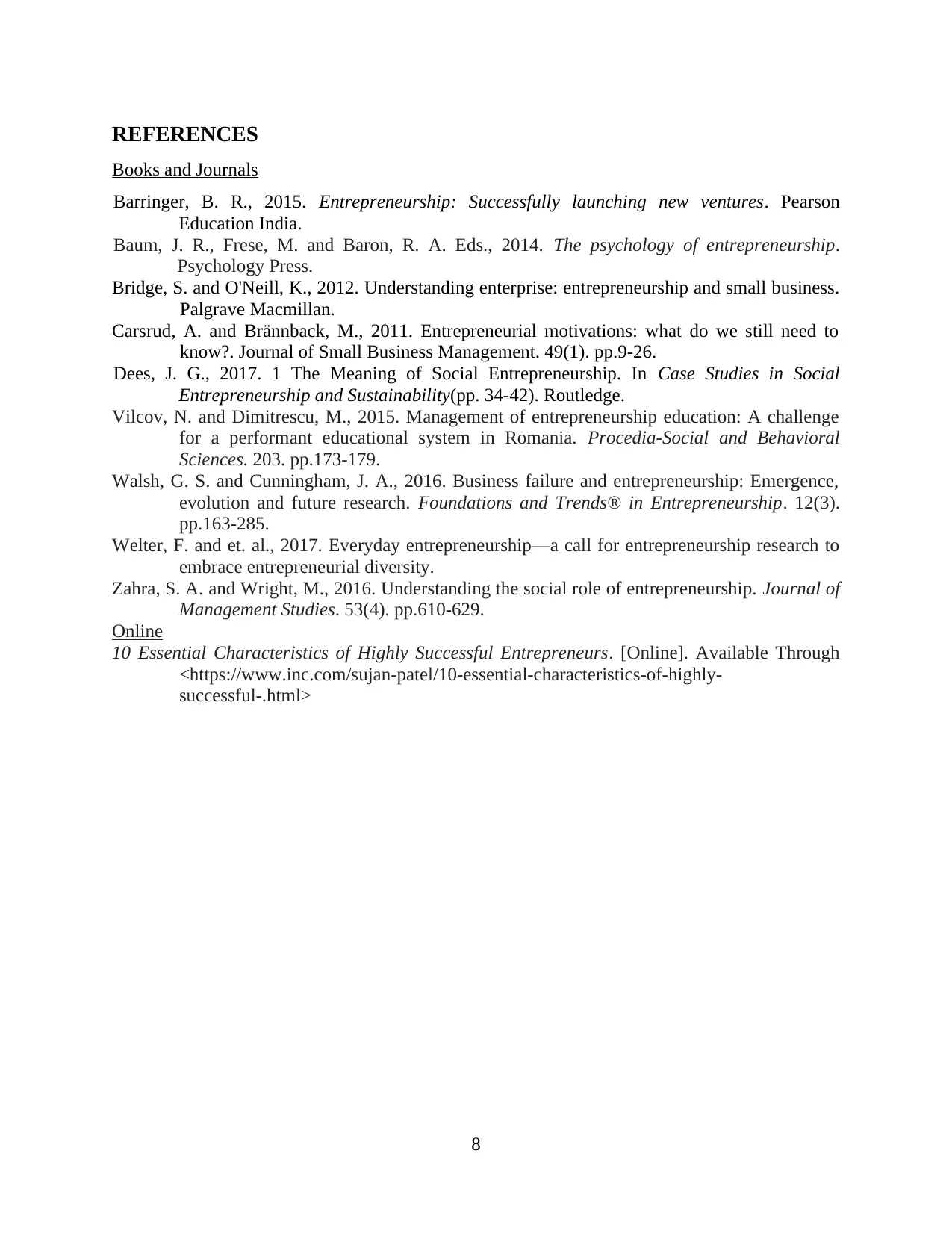
REFERENCES
Books and Journals
Barringer, B. R., 2015. Entrepreneurship: Successfully launching new ventures. Pearson
Education India.
Baum, J. R., Frese, M. and Baron, R. A. Eds., 2014. The psychology of entrepreneurship.
Psychology Press.
Bridge, S. and O'Neill, K., 2012. Understanding enterprise: entrepreneurship and small business.
Palgrave Macmillan.
Carsrud, A. and Brännback, M., 2011. Entrepreneurial motivations: what do we still need to
know?. Journal of Small Business Management. 49(1). pp.9-26.
Dees, J. G., 2017. 1 The Meaning of Social Entrepreneurship. In Case Studies in Social
Entrepreneurship and Sustainability(pp. 34-42). Routledge.
Vilcov, N. and Dimitrescu, M., 2015. Management of entrepreneurship education: A challenge
for a performant educational system in Romania. Procedia-Social and Behavioral
Sciences. 203. pp.173-179.
Walsh, G. S. and Cunningham, J. A., 2016. Business failure and entrepreneurship: Emergence,
evolution and future research. Foundations and Trends® in Entrepreneurship. 12(3).
pp.163-285.
Welter, F. and et. al., 2017. Everyday entrepreneurship—a call for entrepreneurship research to
embrace entrepreneurial diversity.
Zahra, S. A. and Wright, M., 2016. Understanding the social role of entrepreneurship. Journal of
Management Studies. 53(4). pp.610-629.
Online
10 Essential Characteristics of Highly Successful Entrepreneurs. [Online]. Available Through
<https://www.inc.com/sujan-patel/10-essential-characteristics-of-highly-
successful-.html>
8
Books and Journals
Barringer, B. R., 2015. Entrepreneurship: Successfully launching new ventures. Pearson
Education India.
Baum, J. R., Frese, M. and Baron, R. A. Eds., 2014. The psychology of entrepreneurship.
Psychology Press.
Bridge, S. and O'Neill, K., 2012. Understanding enterprise: entrepreneurship and small business.
Palgrave Macmillan.
Carsrud, A. and Brännback, M., 2011. Entrepreneurial motivations: what do we still need to
know?. Journal of Small Business Management. 49(1). pp.9-26.
Dees, J. G., 2017. 1 The Meaning of Social Entrepreneurship. In Case Studies in Social
Entrepreneurship and Sustainability(pp. 34-42). Routledge.
Vilcov, N. and Dimitrescu, M., 2015. Management of entrepreneurship education: A challenge
for a performant educational system in Romania. Procedia-Social and Behavioral
Sciences. 203. pp.173-179.
Walsh, G. S. and Cunningham, J. A., 2016. Business failure and entrepreneurship: Emergence,
evolution and future research. Foundations and Trends® in Entrepreneurship. 12(3).
pp.163-285.
Welter, F. and et. al., 2017. Everyday entrepreneurship—a call for entrepreneurship research to
embrace entrepreneurial diversity.
Zahra, S. A. and Wright, M., 2016. Understanding the social role of entrepreneurship. Journal of
Management Studies. 53(4). pp.610-629.
Online
10 Essential Characteristics of Highly Successful Entrepreneurs. [Online]. Available Through
<https://www.inc.com/sujan-patel/10-essential-characteristics-of-highly-
successful-.html>
8
1 out of 10
Related Documents
Your All-in-One AI-Powered Toolkit for Academic Success.
+13062052269
info@desklib.com
Available 24*7 on WhatsApp / Email
![[object Object]](/_next/static/media/star-bottom.7253800d.svg)
Unlock your academic potential
Copyright © 2020–2026 A2Z Services. All Rights Reserved. Developed and managed by ZUCOL.




